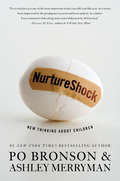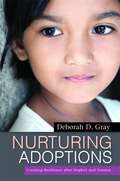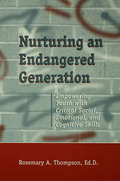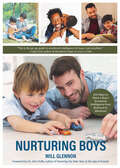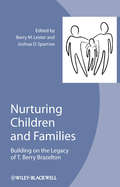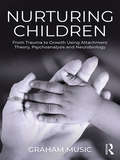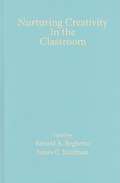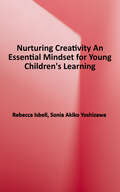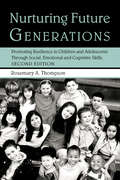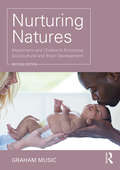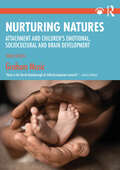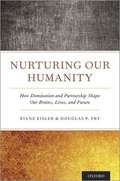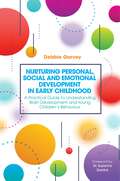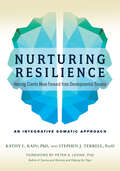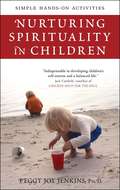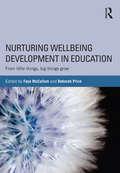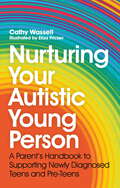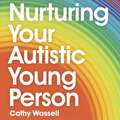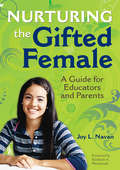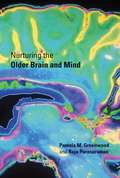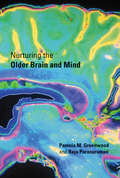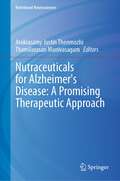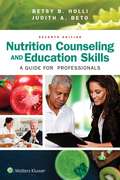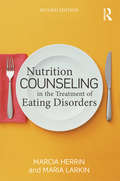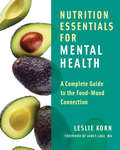- Table View
- List View
NurtureShock: New Thinking About Children
by Po Bronson Ashley MerrymanIn a world of modern, involved, caring parents, why are so many kids aggressive and cruel? Where is intelligence hidden in the brain, and why does that matter? Why do cross-racial friendships decrease in schools that are more integrated? If 98% of kids think lying is morally wrong, then why do 98% of kids lie? What's the single most important thing that helps infants learn language? NurtureShock is a groundbreaking collaboration between award-winning science journalists Po Bronson and Ashley Merryman. They argue that when it comes to children, we've mistaken good intentions for good ideas. With impeccable storytelling and razor-sharp analysis, they demonstrate that many of modern society's strategies for nurturing children are in fact backfiring--because key twists in the science have been overlooked. Nothing like a parenting manual, the authors' work is an insightful exploration of themes and issues that transcend children's (and adults') lives.
Nurturing An Endangered Generation: Empowering Youth with Critical Social, Emotional, & Cognitive Skills
by Rosemary ThompsonFirst published in 1998. Routledge is an imprint of Taylor & Francis, an informa company.
Nurturing Boys: 200 Ways to Raise a Boy's Emotional Intelligence from Boyhood to Manhood
by Will GlennonA nationally recognized parenting expert and spokesperson for fathers, Glennon presents straightforward and well-researched ways both to nurture young men and, in turn, to teach them how to be nurturing.
Nurturing Children and Families
by Joshua D. Sparrow Barry M. LesterThis volume celebrates the work and influence of T. Berry Brazelton, one of the world's foremost pediatricians, by bringing together contributions from researchers and clinicians whose own pioneering work has been inspired by Brazelton's foundations in the field of child development. Includes contributions from experts influenced by the work of Brazelton from a wide range of fields, including pediatrics, psychology, nursing, early childhood education, occupational therapy, and public policyProvides an overview of the field of child development, from the explosion of infant research in the 1960s to contemporary studiesOutlines the achievements and influence of T. Berry Brazelton, one of the world's foremost pediatricians, and his lasting influence in continuing research, practice, and public policy
Nurturing Children: From Trauma to Growth Using Attachment Theory, Psychoanalysis and Neurobiology
by Graham MusicNurturing Children describes children’s lives transformed through therapy. Drawing on decades of experience, internationally respected clinician and trainer Graham Music tackles major issues affecting troubled children, including trauma, neglect, depression and violence. Using psychoanalysis alongside modern developmental thinking from neurobiology, attachment and trauma theory and mindfulness, Music creates his own distinctive blend of approaches to help even the most traumatised of children. A mix of personal accounts and therapeutic riches, Nurturing Children will appeal to anyone helping children, young people and families to lead fuller lives.
Nurturing Creativity in the Classroom
by James C. Kaufman Ronald A. BeghettoNurturing Creativity in the Classroom is a groundbreaking collection of essays by leading scholars, who examine and respond to the tension that many educators face in valuing student creativity but believing that they cannot support it given the curricular constraints of the classroom. Is it possible for teachers to nurture creative development and expression without drifting into curricular chaos? Do curricular constraints necessarily lead to choosing conformity over creativity? This book combines the perspectives of top educators and psychologists to generate practical advice for considering and addressing the challenges of supporting creativity within the classroom. It is unique in its balance of practical recommendations for nurturing creativity and thoughtful appreciation of curricular constraints. This approach helps ensure that the insights and advice found in this collection will take root in educators' practice, rather than being construed as yet another demand placed on their overflowing plate of responsibilities.
Nurturing Creativity: An Essential Mindset for Young Children's Learning
by Rebecca Isbell Sonia Akiko YoshizawaInspiring and supporting innovative thinking Young children have a great capacity for creativity that thrives when nurtured. Early childhood teachers have the opportunity to inspire children’s innovative thinking and doing by Including creative opportunities across all domains of learning- Designing a beautiful space that encourages children’s experimentation and play- Extending children’s learning and challenging their thinking- Documenting children’s thought processes and displaying their work- Involving families and the community in children’s creative endeavors- Reflecting on your beliefs and practices about creativity and nurturing your creativity Learn how to support children as they problem-solve, explore and share new ideas, and collaborate with others, and watch their confidence and capableness grow.
Nurturing Future Generations: Promoting Resilience in Children and Adolescents Through Social, Emotional and Cognitive Skills
by Rosemary A. Thompson, Ed.D.The statistics are pretty grim - young people face an ever increasing tide of poverty, alcohol and drug abuse, violence, suicide, and family dysfunction. Society's response has been slow. Too many young people do not receive consistent, positive, and realistic validation of themselves from those adults on whom they depend. Nurturing Future Generations goes beyond the stilted rhetoric on the problems of youth and the dilemma for society by outlining specific treatment intervention and prevention strategies that address the full spectrum of dysfunctional behavior. It introduces structured intervention strategies for school and community collaboration, with an emphasis on remediation and treatment. Educators and helping professionals will find counseling strategies and psychoeducational techniques that focus on primary prevention. These primary prevention strategies are supported by an understanding of critical social, emotional, and cognitive skills. The new edition provides an increased focus on the positive aspects of youth development, with less emphasis placed on the dysfunctional side of youth behavior. The book addresses emerging research on resiliency and includes increased coverage of best practices for use with troubled youth. A new chapter on LGBT youth issues has been added, and the existing chapters have been substantially revised and updated. The author has reorganized sections within each chapter, adding to the readability and flow of the book, making it more useful as both a professional reference and supplemental text.
Nurturing Natures: Attachment and Children's Emotional, Sociocultural and Brain Development
by Graham MusicThis new edition of the bestselling text, Nurturing Natures, provides an indispensable synthesis of the latest scientific knowledge about children’s emotional development. Integrating a wealth of both up-to-date and classical research from areas such as attachment theory, neuroscience developmental psychology and cross-cultural studies, it weaves these into an accessible enjoyable text which always keeps in mind children recognisable to academics, practitioners and parents. It unpacks the most significant influences on the developing child, including the family and social context. It looks at key developmental stages from life in the womb to the pre-school years and right up until adolescence, covering important topics such as genes and environment, trauma, neglect or resilience. It also examines how children develop language, play and memory and, new to this edition, moral and prosocial capacities. Issues of nature and nurture are addressed and the effects of different kinds of early experiences are unpicked, creating a coherent and balanced view of the developing child in context. Nurturing Natures is written by an experienced child therapist who has used a wide array of research from different disciplines to create a highly readable and scientifically trustworthy text. This book should be essential reading for childcare students, for teachers, social workers, health visitors, early years practitioners and those training or working in child counselling, psychiatry and mental health. Full of fascinating findings, it provides answers to many of the questions people really want to ask about the human journey from conception into adulthood. .
Nurturing Natures: Attachment and Children's Emotional, Sociocultural and Brain Development
by Graham MusicThis new edition of the bestselling text, Nurturing Natures, provides an indispensable synthesis of the latest scientific knowledge about children’s emotional development. Integrating a wealth of both up-to-date and classical research from areas such as attachment theory, neuroscience, developmental psychology and cross-cultural studies, it weaves these into an accessible, enjoyable text that always keeps in mind children recognisable to academics, practitioners and parents. New to this edition, the book considers transgender issues, same-sex parenting, experiences of black and minority ethnic groups, well-being and the impact of mental health in relation to climate change anxiety. It looks at key developmental stages from life in the womb to the preschool years and right up until adolescence, examining how children develop language, play and memory and moral capacities. Issues of nature and nurture are addressed and the effects of different kinds of early experiences are unpicked, creating a coherent and balanced view of the developing child in context. Nurturing Natures is written by an experienced child therapist who has used a wide array of research from different disciplines to create a highly readable and scientifically trustworthy text. Equipped with key points, questions for consideration, further reading and online video chapter introductions, this book is essential reading for childcare students, teachers, social workers, health visitors, early years practitioners and those training or working in child counselling, psychiatry and mental health. Full of fascinating findings, it provides answers to many of the questions people really want to ask about the human journey from conception into adulthood.
Nurturing Our Humanity: How Domination And Partnership Shape Our Brains, Lives, And Future
by Riane Eisler Douglas P. FryNurturing Our Humanity offers a new perspective on our personal and social options in today's world, showing how we can build societies that support our great human capacities for consciousness, caring, and creativity. It brings together findings--largely overlooked--from the natural and social sciences debunking the popular idea that we are hard-wired for selfishness, war, rape, and greed. Its groundbreaking new approach reveals connections between disturbing trends like climate change denial and regressions to strongman rule. <p><p> Moving past right vs. left, religious vs. secular, Eastern vs. Western, and other familiar categories that do not include our formative parent-child and gender relations, it looks at where societies fall on the partnership-domination scale. On one end is the domination system that ranks man over man, man over woman, race over race, and man over nature. On the other end is the more peaceful, egalitarian, gender-balanced, and sustainable partnership system. <p> Nurturing Our Humanity explores how behaviors, values, and socio-economic institutions develop differently in these two environments, documents how this impacts nothing less than how our brains develop, examines cultures from this new perspective (including societies that for millennia oriented toward partnership), and proposes actions supporting the contemporary movement in this more life-sustaining and enhancing direction. It shows how through today's ever more fearful, frenzied, and greed-driven technologies of destruction and exploitation, the domination system may lead us to an evolutionary dead end. A more equitable and sustainable way of life is biologically possible and culturally attainable: we can change our course.
Nurturing Personal, Social and Emotional Development in Early Childhood: A Practical Guide to Understanding Brain Development and Young Children’s Behaviour
by Debbie Garvey Dr Suzanne ZeedykThis direct guide supports practitioners in nurturing personal, social and emotional development (PSED) in young children by demystifying brain development research. Condensing a wealth of recent research and theory around PSED into practical guidance, it gives professionals the knowledge and understanding they need to critically evaluate their own practice and find the best course of action to support PSED in young children. From the perspective of neuroscience, it explores what can help or hinder development, considers why some children bite and why toddlers have tantrums, and questions how well-intentioned actions, such as reward systems or putting new foods on a plate for children to 'just try', may be misguided.
Nurturing Resilience: Helping Clients Move Forward from Developmental Trauma--An Integrative Somatic Approach
by Peter A. Levine Kathy L. Kain Stephen J. TerrellA practical, integrated approach for therapists working with people (both adults and children) who have been impacted by developmental trauma and attachment difficultiesKathy L. Kain and Stephen J. Terrell draw on fifty years of their combined clinical and teaching experience to provide this clear road map for understanding the complexities of early trauma and its related symptoms. Experts in the physiology of trauma, the authors present an introduction to their innovative somatic approach that has evolved to help thousands improve their lives. Synthesizing across disciplines--Attachment, Polyvagal, Neuroscience, Child Development Theory, Trauma, and Somatics--this book provides a new lens through which to understand safety and regulation. It includes the survey used in the groundbreaking ACE Study, which discovered a clear connection between early childhood trauma and chronic health problems. For therapists working with both adults and children and anyone dealing with symptoms that typically arise from early childhood trauma--anxiety, behavioral issues, depression, metabolic disorders, migraine, sleep problems, and more--this book offers fresh hope.
Nurturing Spirituality in Children
by Peggy Joy JenkinsThe greatest gifts that a child can receive are an opened mind, a caring heart, and ignited creativity. This fully expanded, illustrated edition of Nurturing Spirituality in Children includes sixty-two simple and thought-provoking lessons that can be shared with children in less than ten minutes each. The lessons are easy to prepare and understand; they use commonly available materials and complement a wide variety of religious perspectives. Children who develop a healthy balance of mind and spirit are better able to respond to life's challenges when given the tools to think and discover for themselves. Dr. Jenkins gives scores of age-appropriate activities that help children learn empathy, trust, forgiveness, growth, and inner peace.
Nurturing Wellbeing Development in Education: From little things, big things grow
by Deborah Price Faye McCallumAt the core of education, the notion of wellbeing permeates both learner and teacher wellbeing. This book explores the central role and responsibility of education in ensuring the wellbeing of children and young people. Through the employment of vignettes, proactive educational wellbeing initiatives are provided to address issues pertaining to learner and teacher wellbeing, mainstream classrooms, educational marginalisation, disabilities, cyber citizens, initial teacher education and rural education. Through employing diverging theoretical approaches of; expectancy x value theory; ecological systems theory and community practices across digital imagery; case studies; questionnaires and survey methodology, the key message of the centrality of wellbeing to educational success pervades. This book provides a critical engagement with the educational discourse of wellbeing, whilst addressing issues impacting on wellbeing with worldwide implications. It offers a unique insight into both learner and teacher wellbeing and how education can contribute to enhancing wellbeing outcomes for society in general.
Nurturing Your Autistic Young Person: A Parent’s Handbook to Supporting Newly Diagnosed Teens and Pre-Teens
by Cathy WassellAs the parent of a child recognised as autistic as a pre-teen or teen, it can often feel difficult to find the answers you need. Children who make it to late primary/early secondary age before being picked up by the system tend to present with traits that are harder to spot, meaning it can be harder to engage professionals in the diagnostic process and gather the necessary support.Cathy Wassell, CEO of Autistic Girls Network, has tailored this handbook to support parents with older children or teenagers who are at the identification stage, walking them through the basics in an engaging and accessible manner. She addresses key challenges for this age group, including co-occurring conditions, puberty, and safeguarding, as well as looking to the future, advising on schooling options, and beyond.Designed to help parents become fully informed and ensure a nurturing and positive environment for our autistic young people, this is a guide with a focus on difference - not deficit.
Nurturing Your Autistic Young Person: A Parent’s Handbook to Supporting Newly Diagnosed Teens and Pre-Teens
by Cathy WassellAs the parent of a child recognised as autistic as a pre-teen or teen, it can often feel difficult to find the answers you need. Children who make it to late primary/early secondary age before being picked up by the system tend to present with traits that are harder to spot, meaning it can be harder to engage professionals in the diagnostic process and gather the necessary support.Cathy Wassell, CEO of Autistic Girls Network, has tailored this handbook to support parents with older children or teenagers who are at the identification stage, walking them through the basics in an engaging and accessible manner. She addresses key challenges for this age group, including co-occurring conditions, puberty, and safeguarding, as well as looking to the future, advising on schooling options, and beyond.Designed to help parents become fully informed and ensure a nurturing and positive environment for our autistic young people, this is a guide with a focus on difference - not deficit.
Nurturing the Gifted Female: A Guide for Educators and Parents
by Joy NavanStrengthen gifted girls' potential by exploring characteristics of girls' giftedness; factors affecting development; issues of resilience, self-efficacy, and personal ethics; and the importance of supportive adults.
Nurturing the Older Brain and Mind
by Pamela M. Greenwood Raja ParasuramanAlthough our physical abilities clearly decline as we age, cognitive decline in healthy old age is neither universal nor inevitable. In Nurturing the Older Brain, Pamela Greenwood and Raja Parasuraman show that scientific research does not support the popular notion of the inexorable and progressive effects of cognitive aging in all older adults. They report that many adults maintain a high level of cognitive function into old age and that certain experiential and lifestyle factors--including education, exercise, diet, and opportunities for new learning--contribute to the preservation of cognitive abilities. Many popular accounts draw similar conclusions and give similar lifestyle advice but lack supporting scientific evidence. Greenwood and Parasuraman offer a comprehensive review of research on cognitive and brain aging. They show that even the aged brain remains capable of plasticity--the ability to adapt to and benefit from experience--and they summarize evidence that brain plasticity is heightened by certain types of cognitive training, by aerobic exercise, and by certain diets. They also report on the somewhat controversial use of estrogen and cognition-enhancing drugs, on environmental adaptations (including "virtual assistants") that help older adults "age in place," and on genetic factors in cognitive aging. The past twenty years of research points to ways that older adults can lead rich and cognitively vital lives. As millions of baby boomers head toward old age, Greenwood and Parasuraman's accessible book could not be more timely.
Nurturing the Older Brain and Mind
by Pamela M. Greenwood Raja ParasuramanTwo noted researchers explain scientific evidence that shows why certain experiential and lifestyle factors may promote and maintain cognitive vitality in older adults.Although our physical abilities clearly decline as we age, cognitive decline in healthy old age is neither universal nor inevitable. In Nurturing the Older Brain, Pamela Greenwood and Raja Parasuraman show that scientific research does not support the popular notion of the inexorable and progressive effects of cognitive aging in all older adults. They report that many adults maintain a high level of cognitive function into old age and that certain experiential and lifestyle factors—including education, exercise, diet, and opportunities for new learning—contribute to the preservation of cognitive abilities.Many popular accounts draw similar conclusions and give similar lifestyle advice but lack supporting scientific evidence. Greenwood and Parasuraman offer a comprehensive review of research on cognitive and brain aging. They show that even the aged brain remains capable of plasticity—the ability to adapt to and benefit from experience—and they summarize evidence that brain plasticity is heightened by certain types of cognitive training, by aerobic exercise, and by certain diets. They also report on the somewhat controversial use of estrogen and cognition-enhancing drugs, on environmental adaptations (including "virtual assistants") that help older adults "age in place," and on genetic factors in cognitive aging.The past twenty years of research points to ways that older adults can lead rich and cognitively vital lives. As millions of baby boomers head toward old age, Greenwood and Parasuraman's accessible book could not be more timely.
Nutraceuticals for Alzheimer's Disease: A Promising Therapeutic Approach (Nutritional Neurosciences)
by Arokiasamy Justin Thenmozhi Thamilarasan ManivasagamThis book reviews the potential effect of diet modification, lipids, and carbohydrate consumptions, vitamin supplementation, antioxidants, and nutraceuticals in the prevention and management of Alzheimer's disease. The initial chapter of the book presents the pathophysiological mechanisms, risk factors, genetic predisposition, disease diagnosis, pathology, and current treatment strategies against Alzheimer's disease. It also highlights recent developments in exploring novel compounds for the prevention and treatment of Alzheimer's disease. Subsequently, it highlights the therapeutic effect and regulation of molecular targets by natural compounds. The book discusses the potential of natural compounds in inhibiting the formation and deposition of Aβ peptides. It examines the natural compounds in modulating intracellular signaling molecules and enzymes involved in the pathogenesis of Alzheimer's disease. In summary, this book helps understand the role of natural compounds as a therapeutic approach in amelioration and preventing detrimental effects of Alzheimer's disease.
Nutrition Counseling And Education Skills: A Guide For Professionals
by Judith Beto Betsy HolliNow in vibrant full color, this updated Seventh Edition of Holli’s best-selling Nutrition Counseling and Education Skills: A Guide for Professionals helps students develop the communications, counseling, interviewing, motivational, and professional skills they’ll need as Registered Dietitian professionals. Throughout the book, the authors focus on effective nutrition interventions, evidence-based theories and models, clinical nutrition principles, and knowledge of behavioral science and educational approaches. Packed with activities, case studies, and self-assessment questions, the Seventh Edition features new content that reflects the latest changes in the field, new online videos that bring nutrition counseling techniques to life, and a powerful array of new and enhanced in-text and online learning tools.
Nutrition Counseling in the Treatment of Eating Disorders
by Marcia Herrin Maria LarkinMarcia Herrin and Maria Larkin have collaborated on the second edition of Nutrition Counseling in the Treatment of Eating Disorders, infusing research-based approaches and their own clinically-refined tools for managing food and weight-related issues. New to this edition is a section on nutrition counseling interventions derived from cognitive behavioral therapy-enhanced, dialectical behavioral therapy, family-based treatment, and motivational interviewing techniques. Readers will appreciate the state of the art nutrition and weight assessment guidelines, the practical clinical techniques for managing bingeing, purging, excessive exercise, and weight restoration as well as the unique food planning approach developed by the authors. As a comprehensive overview of food and weight-related treatments, this book is an indispensible resource for nutrition counselors, psychotherapists, psychiatrists, physicians, and primary care providers.
Nutrition Essentials for Mental Health: A Complete Guide to the Food-Mood Connection
by James Lake Leslie KornExploring the connection between nutrition and mental wellness so therapists can provide more effective, integrated treatment. Diet is an essential component of a client’s clinical profile. Few therapists, however, have any nutritional training, and many don’t know where to begin. In Nutrition Essentials for Mental Health, Leslie Korn provides clinicians with a practical guide to the complex relationship between what we eat and the way we think, feel, and interact with the world. Where there is mental illness there is frequently a history of digestive and nutritional problems. Digestive problems in turn exacerbate mental distress, all of which can be improved by nutritional changes. It’s not unusual for a deficit or excess of certain nutrients to disguise itself as a mood disorder. Indeed, nutritional deficiencies factor into most mental illness—from anxiety and depression to schizophrenia and PTSD—and dietary changes can work alongside or even replace medications to alleviate symptoms and support mental wellness. Nutrition Essentials for Mental Health offers the mental health clinician the principles and practices necessary to provide clients with nutritional counseling to improve mood and mental health. Integrating clinical evidence with the author’s extensive clinical experience, it takes clinicians step-by-step through the essentials for integrating nutritional therapies into mental health treatment. Throughout, brief clinical vignettes illustrate commonly encountered obstacles and how to overcome them. Readers will learn: • Why nutrition matters in mental health • The role of various nutrients in nourishing both the brain and the gut, the “second brain” • Typical nutritional culprits that underlie or exacerbate specific mental disorders • Assessment techniques for evaluating a client’s unique nutritional needs, and counseling methods for the challenging but rewarding process of nutritional change. • Leading-edge protocols for the use of various macro- and micronutrients, vitamins, and supplements to improve mental health • Considerations for food allergies, sensitivities, and other special diets • The effects of foods and nutrients on DSM-5 categories of illness, and alternatives to pharmaceuticals for treatment • Comprehensive, stage-based approaches to coaching clients about dietary plans, nutritional supplements, and other resources • Ideas for practical, affordable, and individualized diets, along with optimal cooking methods and recipes • Nutritional strategies to help with withdrawal from drugs, alcohol and pharmaceuticals And much more. With this resource in hand, clinicians can enhance the efficacy of all their methods and be prepared to support clients’ mental health with more effective, integrated treatment.
